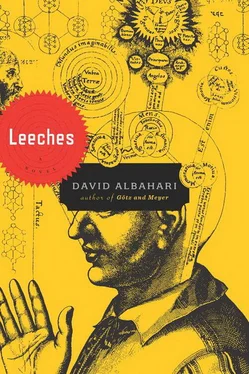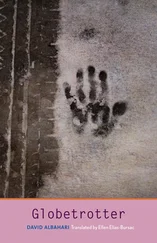Fine, said the editor, and hung up. I lasted in my apartment until lunchtime, then went out to the quay. From the place where I'd been standing the evening before, there was nothing to see along the riverbank, at least not where the woman and man had been. I went over to the steps the woman had climbed, but found nothing there either. Several chunks of dried mud might possibly have come off her shoes, as well as a crumpled leaf resting on the highest step, however, the mud and the leaf could tell me nothing that I didn't already know. I went across the quay, all the way down to the Venezia, and then circled back to the Harbormaster's. If she had seen me, or if she had somehow figured out that I was following her, where might that have happened? I never came too close, and anyway there were lots of people walking along the quay and many going in the same direction as the two of us. Why would she think that I, of all people, was following her? Then I remembered the man in the black trench coat. Maybe he was the one who had drawn her attention to me? Nonsense, I thought, but the more I tried to forget the man, the more I thought of him. And later, as I walked the streets where she might have slipped by me, the man in the black trench coat was, so to speak, there with me. I went down Gospodska, Zmaj Jovina, and Karamatina streets, and the streets that crossed them. The only one left for me to explore was the street that ran parallel to the promenade, toward the Golden Oar café. Just then, as I was turning, I noticed a button on the sidewalk at the corner of Zmaj Jovina Street. Black, shiny, a winter coat kind of button, with wisps of thread still in the buttonholes, it lay by a crack that spread across the asphalt like a root. Both the woman and the man had been wearing dark navy blue or black jackets, of that I was sure, but I was also sure that the jackets had had zippers, and not buttons. Besides, the button on the sidewalk was too big for a jacket, so it couldn't have been hers. I started off for the Golden Oar. After a couple of steps, I stopped and spun around. The button was still there, in the exact same spot. I picked it up, then noticed a little sign under it, probably written with a felt-tip pen: a triangle inscribed in a circle, and inside it, another triangle pointing the other way. I put the button down and stood up. I was baffled, I admit. Maybe it was a sign, maybe it even had something to do with the woman, but the tricky part was that the triangle was pointing in three different directions at the same time, to Zmaj Jovina Street, to the Harbormaster's, and to the street that ran to the Golden Oar. The café, in fact, didn't mean the end of the woman's possible movements, even if she had gone that way, because the street ran on, by the power plant, all the way to a newly constructed apartment building. The kind of embarrassment she must have felt heals best in isolation, and if she lived there, she would have run straight across the street and into her building. It's possible of course that she might have turned right by the Golden Oar and come out on the square that is on the way to the open-air market and the Zemun city center, but that struck me as making her route unnecessarily long, since she would have reached the center of town more easily and quickly if she had gone along the streets that fanned out from the Harbormaster's. No one, however, was at the Golden Oar. The door was locked, the windows shrouded with curtains, the stoop littered with trash. For a moment I considered picking up each piece of trash to see if there was still another sign under it, but I soon gave up and started home. The day was drawing to a close, and I needed to work on the article I had promised the editor. These last few months I had been writing short essays and commentaries for the weekly paper
Minut, and that, with the occasional literary translation, was my chief source of income. Several of my pieces had elicited quite a response from the readers, which led the editor to raise my fee, especially when the debate over my piece on the pillaging of the national museums had spilled into the rest of the press and onto television. Most of what I wrote, I should add, was not so sharply intoned, and that piece, which made my reputation, so to speak, had originated with a good friend of mine who worked at one of the ransacked galleries. The thieves, as I put it, were not criminals in the employ of some rich art lover or the black market, but rather public figures who used their connections to borrow paintings and art objects, then simply neglected to return them. I named a few names — some actors, directors of large companies and members of the Academy of Arts and Sciences, politicians and bureaucrats — and that seemed to draw attention to my column, which virtually no one had bothered to read before. Who cared about my angry tirades on ecological neglect, the lack of investment in culture, the knee-jerk predictability of juries in awarding the most prestigious literary prizes? The list of the people prepared to help themselves to things that belonged to others, things that, as I pointed out, belonged to us all, had far greater appeal. I was pleased, because the editor upped my rate, even if I hadn't produced another story along those lines since then. The obligation to write the articles remained, however, and, like all obligations, became increasingly arduous: it used to take me fifteen minutes to write a piece, and now I would labor over the opening paragraph for an hour. I spent most of the time staring at the flickering blank screen of my computer, miserable that I had to write at all. I yanked sentences out of myself as if I were extracting molars, then raged because I couldn't link them together; the piece wouldn't sound like a cohesive whole, but rather like a series of discordant, differing positions that often contradicted themselves. That evening, however, I wrote my article without a hitch. I sat down, turned on the computer, double-clicked on my word-processing program, and began to write. At first I wasn't sure what to write about, but then up came mud, then the river and the riverbank, the bridges, the quay, and in closing I lambasted our mindset, our traditional aversion to water, and the municipal authorities who have not embraced the fact that the Danube and the Sava rivers define our city. Not a particularly original argument, but there was a certain passion to the tone and rhythm of sentences, which gave me a special satisfaction. Also, that I wrote the piece as fast as I had written the early ones was cause for celebration. I thought about rolling a joint, but it was still early in the day for hashish, so I went into the kitchen and poured myself a little brandy. Outside it was dark. The light of the street lamps shone across the street, reflected off the traffic signs, melted into the passageways and dark entrances. Should I go back to the Harbormaster's? Sometimes one sees things better in the dark than in the light of day. I took a sheet of paper, an old compass and a plastic ruler, and started to draw the sign I had stumbled on under the button. I used the compass to draw the circle, and then marked six equidistant points along the periphery of the circle, and connected every other point, which gave me an equilateral triangle. I measured the sides of the triangle, marked the midpoint on each side, and when I connected those points, I got a new triangle, which was facing in the opposite direction, so that its apex intersected the base of the first triangle. I stared at the geometric figure, sipped the brandy, and shook my head. If there was any meaning in all this, I was not getting it. And besides, why would it end here? There was yet another new little triangle that could be inserted inside the inner one, or, indeed, another circle, and such additions could, at least theoretically, go on forever, and nothing would change, of that I was certain. Or should I, perhaps, have been less certain, should I have been more skeptical? Again I looked at the geometric figure on the piece of paper. By placing the smaller triangle inside the larger one I had actually created four like-sized small triangles, and when earlier I had inscribed the larger triangle inside the circle, I had made three pieces in the shape of apple slices. My grasp of mathematics had always been weak, but perhaps these combinations of geometric shapes, their surfaces, or the proportional ratios had some hidden meaning? The longer I chewed on this, the more convinced I became that the explanation for the events on the quay and the woman's disappearance lay in these mathematical relationships, and that if I were to penetrate their secret, they would lead me straight to her door. I remembered that Dragan Mišović, who had attended gymnasium with me, went on to study math and, as I had heard at the most recent alumni gathering, he was working at a scientific institute. Dragan had not come to the gathering himself, nor did he come to any of the earlier ones, and the person who had mentioned him said that no one had seen him and that apparently he lived in isolation, a kind of hermit. Winter and spring, he wore the same coat and the same shoes, though his shirt was always clean and ironed and the cufflinks polished to a high sheen. If someone came up to him, the person continued, they could never be sure whether Dragan would respond or just stare at them in silence, regardless of how long they had known each other. Sometimes, out of the blue, Dragan would start screaming at whoever he happened to be speaking with, insult them and threaten to sue them or call the police, and then only a few minutes later he would grin and offer them the mints he always carried in his pocket. I understood his passion for mints because I shared it, I remember I said at the time, but as for the rest of it, all I could do was tap an index finger to my temple and shake my head sadly. I did precisely that, and the laughter that erupted brought any further conversation about our old schoolmate to an end. I slightly knew the person who had spoken of him; I looked up her phone number and gave her a call. The darkness outside had thickened, it was night. The phone rang once. At first she said she didn't know who I was, then claimed she had never said anything about Dragan Mišović then, when she remembered what she had said, she said she didn't know where he lived; when she realized I wasn't going to go away, she suggested I look at the lists of tenants in the New Belgrade high-rises located near where there used to be an underpass. She said she ran into him there from time to time, but not since she'd moved to Banovo Brdo a few months before. This cannot be a good sign, I thought. I go looking for a person who is supposed to help me find someone, and then it turns out that, in a figurative sense, I am looking for that person, too. What kind of a world is this, in which so many people go missing? And if they are all lost, what guarantee do I have that I myself didn't get lost long ago? If I had smoked that joint I had in mind earlier, I would understand the questions that were assailing me, but after a little brandy the only thing I felt was my head aching. I got undressed and lay down. Amazingly, I fell asleep instantly and didn't open my eyes until nine the next morning. The sun was shining, and clouds were skittering across the sky, as if racing one another. I got up, and I looked for the piece I'd written the day before. Reading it first thing in the morning, when my mind was empty like a Zen priest's, was the best way for me to gauge whether I'd written a decent piece the day before. A fear of water, I read at the end of the text, is the beginning of all our other fears and a source of general malaise, and until we learn to control that fear, we will be forced, like Sisyphus, to keep going back to the beginning. This was not a particularly original insight, as I said before, but the piece roused the emotions, and when I read it out loud, to feel its rhythm, my voice trembled and some of the sentences crumbled and broke. I didn't know what to attribute such sensitivity to that morning: after all, if someone doesn't like the river, it is not the end of the world. It struck me then that in writing about the muddy riverbank, I was actually writing about the man and the woman, about his hand slowly lifting, then swinging down fast on her cheek, and about how when she came up the steps, she was like a diver rising from the river bottom, anxious about coming up to the surface. The piece of paper with the combined geometric figure on it lay on the table. Nothing had changed, the circle was still guarding the triangles, the triangles were still silent, the apple-slice pieces held their balance on the slippery sides, the peaks pointed in different directions. Had I been at all reasonable, I would have crumpled that piece of paper and tossed it in the basket. Instead I got dressed and decided to go look for my gymnasium friend among the high-rises in the periphery of New Belgrade. But first I had to go to the
Читать дальше







![David Jagusson - Fesselspiele mit Meister David [Hardcore BDSM]](/books/486693/david-jagusson-fesselspiele-mit-meister-david-har-thumb.webp)




